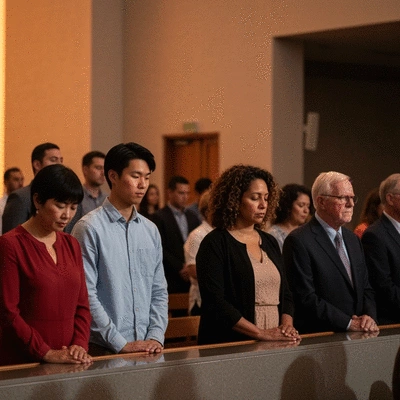Defining Worship & Its Significance
Worship is reverence for God, an expression of faith through singing, prayer, and community. It provides peace, renewal, and deepens spiritual connection.
- ✓ Acts of Praise
- ✓ Community Engagement
- ✓ Spiritual Growth
Welcome to The Upper Room DFW – your guide to finding a spiritual home!
Oct 21
Have you ever experienced the transformative power of worship? It's more than a ceremony; it's a profound journey of connection and growth. In the following points, you will uncover the fundamental lessons that worship services provide, illuminating their significant role in our lives.
Worship services are fundamental to Christian faith, fostering spiritual connection and community engagement. The visual below highlights three core aspects: Defining Worship, Spiritual Growth & Community, and Congregation Dynamics.
Worship is reverence for God, an expression of faith through singing, prayer, and community. It provides peace, renewal, and deepens spiritual connection.
Worship builds connections, fostering a supportive network where members share joys and struggles, vital for collective spiritual development.
Vibrant worship practices create an environment where members express faith openly, leading to increased volunteerism and community outreach.
Reflecting on personal preferences for music, liturgy, and community involvement helps in selecting a meaningful worship experience.
Worship services play a crucial role in the Christian faith, acting as a foundation for spiritual connection and community engagement. In our journey at The Upper Room DFW, I’ve observed how worship transcends mere rituals, becoming a powerful source of strength and belonging for many. So, what exactly is worship, and why is it important in our daily lives?
At its core, worship is about reverence and adoration for God. It’s an expression of our faith that can take many forms, from singing hymns to quiet prayer. Most importantly, worship invites us to acknowledge our place within the larger tapestry of community and spirituality. When we gather to worship, we're not just participating in a tradition; we're actively engaging with our beliefs and affirming our purpose in life.
Many people find that worship services provide a sense of peace and renewal. It’s a time to pause, reflect, and align our hearts with our spiritual values. Whether you’re attending a service for the first time or the hundredth, each experience can offer new insights and deepen your relationship with God.
Worship is not only a personal journey; it’s also about building community. At The Upper Room DFW, I’ve seen firsthand how services foster connections among attendees. When we gather in worship, we share our joys, struggles, and prayers, creating a supportive network that goes beyond Sunday mornings. In fact, a study on the effects of worship on spiritual growth highlights its crucial role in fostering collective spiritual development.
This sense of belonging is vital for spiritual growth. As we worship together, we encourage one another in our faith journeys. It allows us to learn from each other's experiences, share gifts, and witness the diverse expressions of faith within our community. Have you ever left a service feeling uplifted by the shared spirit of the congregation? That’s the magic of community worship!
The dynamics within a congregation can significantly shift based on its worship practices. Engaging in community worship creates an environment where members feel safe to express their faith openly and authentically. A vibrant worship service can spark excitement and enthusiasm, fostering a culture of involvement and service. Recent reports on faith communities underscore how active worship participation can lead to stronger congregational bonds and increased engagement.
Moreover, participation in worship services can lead to increased volunteerism and community outreach. When we feel connected to one another, we’re more likely to step up and serve others, whether through church activities or local initiatives. This sense of collective action not only strengthens our congregations but also extends our reach into the wider community.
As we dive deeper into the significance of worship services, we would love to hear from you! What aspect of worship resonates the most with you?
Choosing the right worship service can feel like a journey in itself! With so many options available, it’s essential to evaluate worship styles that align with your personal or church preferences. Think about what resonates with you—traditional hymns, lively contemporary music, or perhaps a blend of both? Taking time to reflect on these elements can help guide your decision and ensure a meaningful experience.
When evaluating worship styles, it’s important to remember that each service brings its own unique flavor to the experience. By exploring various options, you can find a service that not only nurtures your faith but also makes you feel at home.
The primary purpose of worship services is to provide a setting for reverence and adoration of God, fostering spiritual connection, personal reflection, and community engagement among believers.
Worship services contribute to spiritual growth by offering opportunities for praise, prayer, and learning through teachings. They also build a supportive community where individuals can share their faith journeys and receive encouragement.
Community worship positively impacts congregation dynamics by fostering enhanced relationships, increased participation in church activities, and a greater sense of shared goals, often leading to more volunteerism and outreach.
To choose the right worship style, consider your personal preferences for music (traditional vs. contemporary), liturgical elements (structured vs. spontaneous), and the level of community engagement you desire. Visiting different churches can help you find what resonates most with you.
Traditional services are rooted in historical practices with hymns and structured liturgy. Contemporary services are more relaxed with modern music and focus on personal connection. Ecumenical services blend elements from different denominations to promote unity and inclusivity.
Finding a worship style that fits is about exploring how various practices resonate with you personally or with your congregation. Here are a few factors to consider:
These factors can significantly influence your overall satisfaction and sense of belonging in a church community. At The Upper Room DFW, we encourage you to visit different local churches to see which worship styles resonate with you the most!
Every congregation has its unique makeup, and adapting worship services to fit these demographics is crucial. Factors such as age, cultural background, and community needs can affect what worship looks like. Here are some ways to adapt:
As a community-focused platform, The Upper Room DFW strives to connect you with churches that prioritize inclusivity, making worship accessible for everyone! For more insights into how churches adapt and grow, you might find this exploration of church growth and worship styles insightful.
When it comes to selecting a worship service, the choice between traditional, contemporary, and ecumenical services can seem daunting. Each has its strengths and appeals:
By understanding the unique characteristics of each type, you can better navigate your choices and find the service that feels just right for you. I recommend visiting different churches through The Upper Room DFW to experience firsthand how these styles resonate with you!
Here is a quick recap of the important points discussed in the article:
Passionate advocate for faith-based communities. Dedicated to fostering connections among local congregations.
MICHAEL K is dedicated to helping individuals and families find their spiritual home in the DFW metroplex, nurturing vibrant community ties. Join her on our blog for insights and connections that simplify your search and enhance your faith journey.
Passionate advocate for faith-based communities. Nurturer of community ties.
Evelyn Thatcher is dedicated to fostering connections among local congregations in the Dallas-Fort Worth area, ensuring everyone finds a spiritual home that resonates with their beliefs and values. Through The Upper Room DFW, she empowers the faith community to discover diverse worship venues and community engagement opportunities. Join her on our blog for insights and stories that uplift and enrich your faith journey and enhance your sense of belonging.


